Report on Sophia University Africa Weeks 2023
Building Schools in Slums in Africa – Smiles of Children, Sparkle of Life
On May 15, Ms. Chiaki HAYAKAWA, who runs Magoso School, a school for underprivileged children in the slum town of Kibera, Kenya, was invited to deliver a lecture.
In the beginning of the lecture, Ms. Hayakawa explained the current conditions of those living in Kibera. Despite their positive attitude, she explained how tough their living environment is, in which they are constantly battling diseases and standing side by side to death. She then introduced the background of the establishment of Magoso School and episodes of alumni who rallied from despair and later graduated with hope. Among reasons for operating a school in a slum area, she said, “Education leads to wisdom and skills to help people get out of hardship. Witnessing the alumni of the Magoso School moving forward vigorously, I am reminded of the power of learning”.
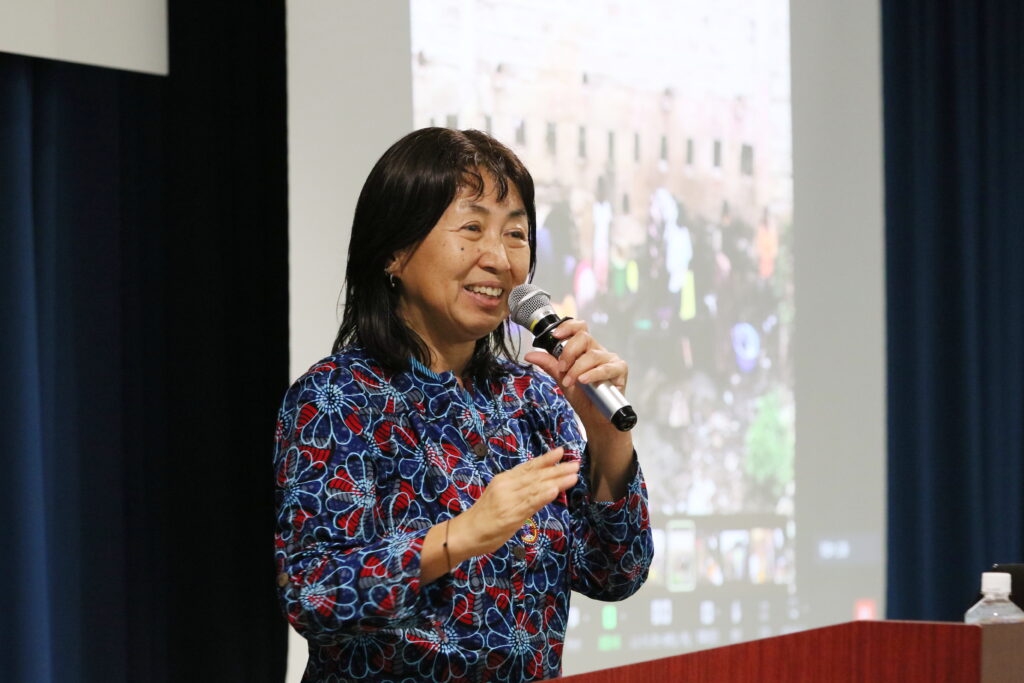
During the Q&A session following the lecture, in response to a question concerning support and exchanges that Japan can provide, she responded, “First of all, it is important to get to know each other. In order to achieve this, dialogue is necessary, and by facing each other as equal and discussing issues, new approaches will emerge. At the same time, learning about the history will provide insight into the present. About 100 audience gathered at the venue, and about 120 people viewed the lecture online. The event captured a great deal of interest.
Youth Conference Let’s Talk with Researchers from African Regions
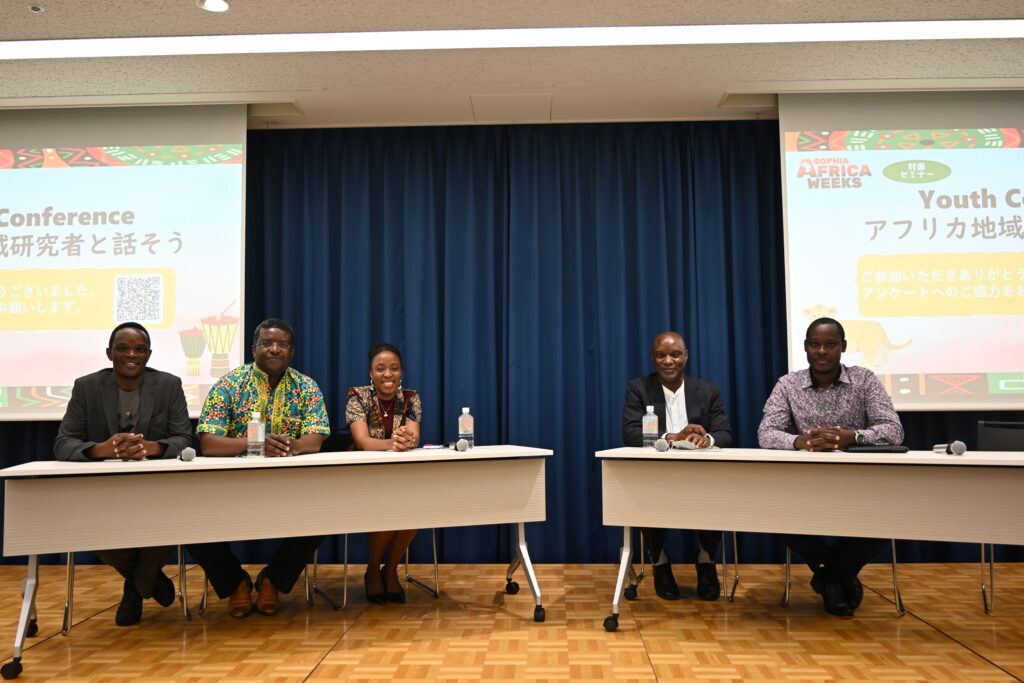
On May 20, a seminar was held to promote academic exchange with researchers from the African region working in Japan. Dr. Kithinji KINYUA, Distinguished Research Fellow at Sophia University, facilitated the seminar. Originally from Kenya, Dr. KINYUA’s research interests include the political ethnography on digital platforms in Africa at the Institute of Asian Cultures.
In the first part of the session, Dr. KINYUA introduced four researchers from the African region. First, Prof. Christian OTCHIA, Associate Professor at Graduate School of International Development Studies, Nagoya University, who is originally from the Democratic Republic of Congo, introduced his research on development economics, using examples such as “kaizen (improvement)” in Japan. Three researchers from Uganda then gave presentations. Ms. Rebecca BABIRYE, Assistant Professor at the Faculty of Theology, Tokyo Christian University, gave a presentation on cross-cultural exchange from the perspective of her field of religious studies. Dr. Vick L. SSALI, a foreign teacher in the Department of Literature at Aichi-Gakuin University who studies global society, used slides to explain the position of Africa in the context of language and cultural education in Japan and attempts to connect African researchers in Japan with those in Africa. Dr. Ian KARUSIGARIRA of the National Graduate Institute for Policy Studies (GRIPS) introduced his expertise in political science incorporating a discussion of the Japanese political system. After their presentation, a lively Q&A session followed, in which we discussed how to change monolithic views of Africa among people in Japan.
In the second part of the session, participants were divided into groups and exchanged opinions with four researchers who gave presentations. Participants enjoyed the exchange throughout the session, with lively exchanges.
Do you know Lesotho, the Kingdom of the Sky?
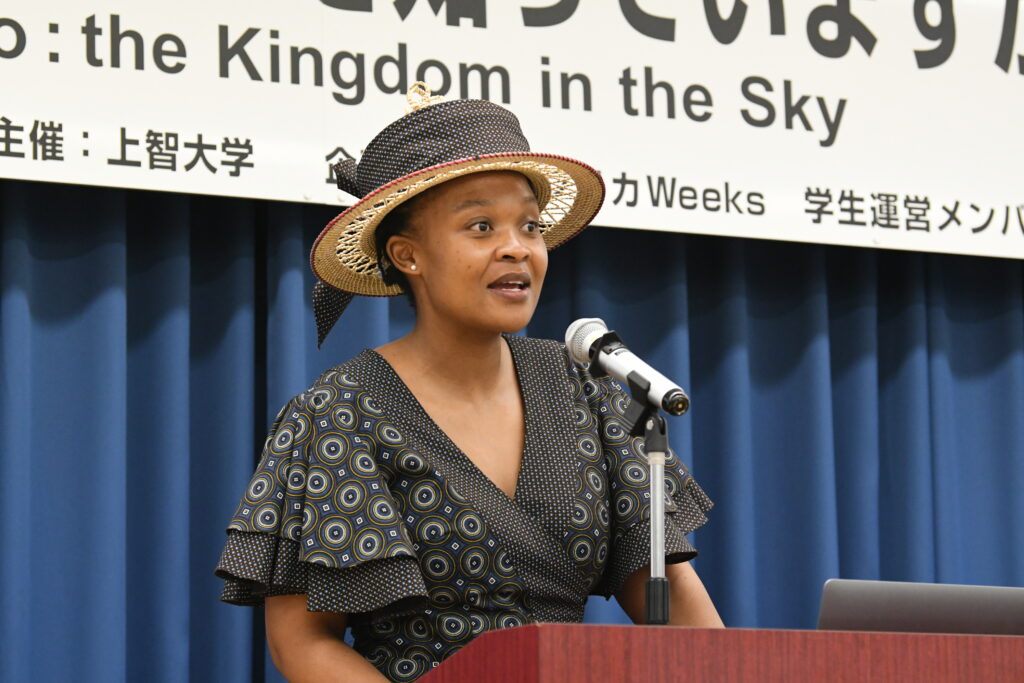
On May 22, a diplomat from the Embassy of the Kingdom of Lesotho in Tokyo was invited to give a lecture. Lesotho is a landlocked kingdom surrounded by South Africa on all four sides and is called the “Kingdom of the Sky” because the entire country is over 1,400 meters above sea level.
Ms. Sole MAMASUPHA, Counsellor at the Embassy of the Kingdom of Lesotho, opened the session with an introduction to Lesotho. Her presentation included basic information such as geography and population, education system, historical background, traditional costumes, food, and household goods, with slides. All participants, including high school students, enjoyed studying images of Lesotho’s rich natural environment and listened attentively to the presentation.
Then, Ms. Lucy KOSUGI, a native of Lesotho who came to Japan following her marriage to a Japanese man and now lives in Machida City, took the podium. She spoke about her wedding in Lesotho as well as the challenges of living and raising children in Japan.
After the speech, Ms. MAMASUPHA introduced “Morabaraba,” an ancient board game in Lesotho and other southern African countries, and the traditional costumes as well as traditional hats of Lesotho, brought to the venue. Guests were able to experience a taste of Lesotho by actually trying the game and having their pictures taken wearing the costumes and hats.
Making Prosthetic Legs in Rwanda – Working Toward Restoration
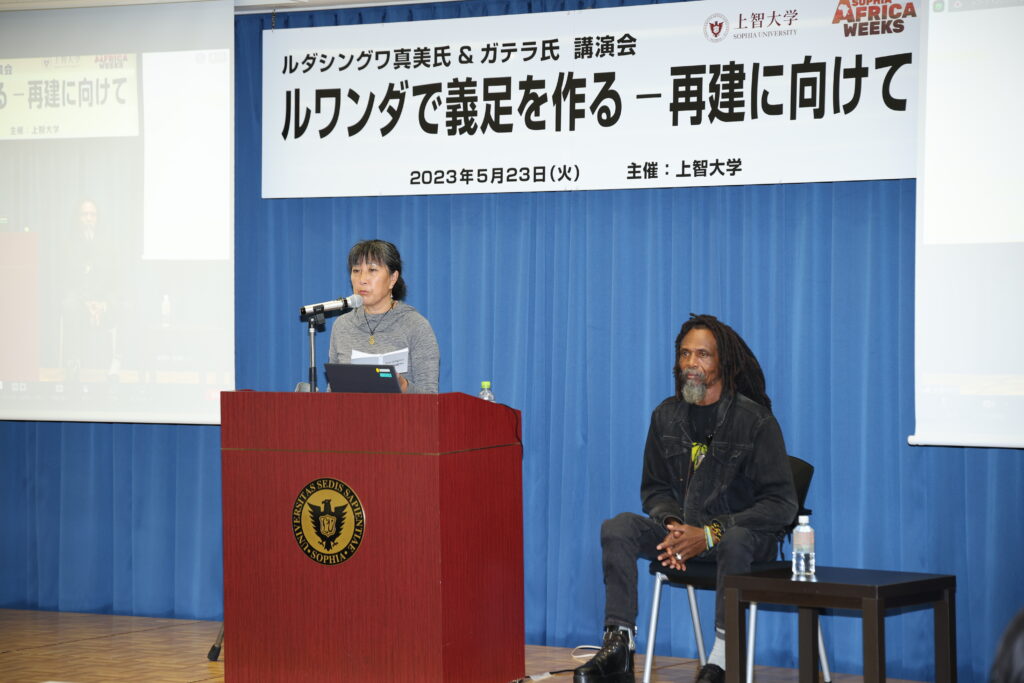
On May 23, Ms. Mami RUDASINGWA, a humanitarian aid worker in Rwanda, and Mr. Gatera RUDASINGWA, her personal and business partner who also wears a prosthetic leg, were invited to give a lecture concerning aid for the physically disabled in Rwanda.
They have established a prosthetic limb factory in the capital city of Kigali and are engaged in activities such as manufacturing orthotic devices, training orthotists, promoting sports for the disabled, and providing vocational training for people with disabilities.
At the beginning of the lecture, she explained the situation in the region with historical background, noting that “there are many people in Rwanda who still need artificial limbs today, partly due to the genocide of the past.” They then explained how they started the project, the challenges they faced in gathering funds and materials, and the episode in which they piled up bricks on a vacant lot and built a factory by themselves as the base of operations. They then said, “We have been able to continue our work despite various challenges and setbacks because we have met many people and received support from them. We hope to continue our activities hereafter.”
During the Q&A session at the end of the session, the audience raised many questions, showing the high level of interest in the topic.
Introducing Sophia University Africa Studies
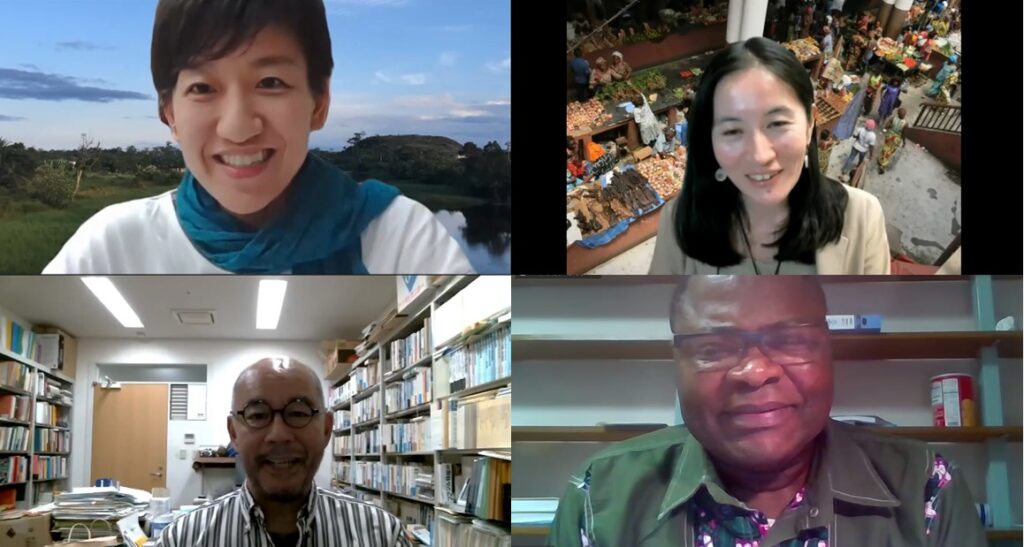
On May 25, a seminar was held to introduce Sophia University’s research and practical learning programs in Africa. First, Lecturer Eri YAMAZAKI of the Center for Global Education and Discovery, who facilitated the seminar, introduced the three pillars of Sophia University’s Africa activities: “Academic and Research,” “Education,” and “Social Contribution.”
Following her introduction, three faculty members involved in African studies gave speeches.
Associate Professor Mikako TODA of Faculty of Global Studies focuses on the Central African region, studying how human life corresponds to the ecological environment. In this context, she also looks into the lives of people with disabilities. She spoke of how her research themes are expanding to include African area studies through the lens of people with disabilities, views of disability in non-Western societies, and the connection between disability studies and cultural anthropology and gender studies.
Prof. Tatsuhiro YAZAWA of Department of Luso-Brazilian Studies focuses on Africa and Brazil as two main topics of his research. In particular, he focuses on the politics and history of Sub-Saharan Africa, especially former Portuguese Africa, and the history and interracial relations of Brazil’s black population. He cited three main reasons for his research: to shed light on the neglected Portuguese-speaking region, to portray the intelligence and bravery of African (descent) people in their struggle against colonial rule and racism, and to unravel the dynamism that transcends a single region.
Prof. Matadi Ghislain TSHIKENDWA, who is serving as a Jesuit Visiting Professor Abroad, shared how his classes are conducted at the University. He emphasized that it is essential for African and Japanese people to interact with each other and gain mutual understanding.
Finally, Ms. Yamazaki introduced the “Learning from Africa,” a practical learning program that launched in 2015, and presented a video message from the Centre de Recherche et d’Action pour la Paix (CERAP: Center for Peace and Research Activities) in Cote d’Ivoire, a partner institution of Sophia University. The seminar concluded with an introduction about the contribution to society that enhance understanding of African regions.
Student Projects
25 student volunteers were responsible for the overall planning and operation of Africa Weeks. In addition, the following student-led projects were carried out.
African Workship – Africa Seen Through Coffee
On May 26, a workshop was held exclusively for university and high school students. Mr. Masato YAMADA, (Graduate, Department of English Literature/Department of Theology) who runs the “Warm Hearts Coffee Club,” was invited to speak about his organization while sampling some of their coffee. He introduced his organization’s support for school lunches served in schools in Malawi. He spoke passionately about the power of school lunches and introduced the support system and fair trade in detail. Participants were then divided into four groups to discuss and gain a deeper understanding of the topics prepared by the students who were running the event.
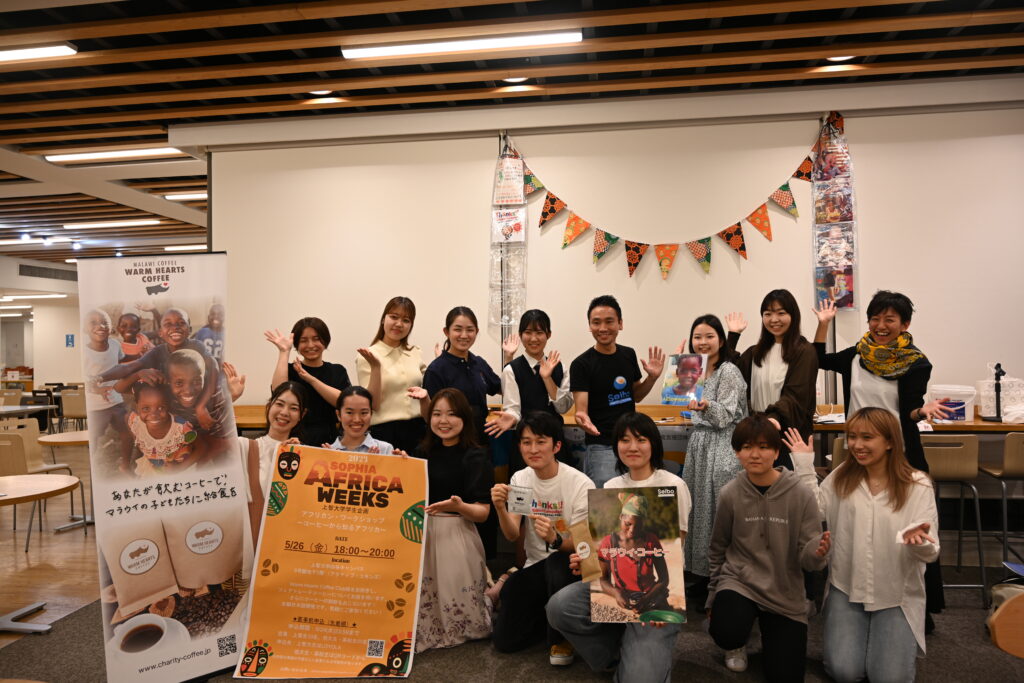
Magazine Project
This is the third year for the magazine project; “With AFRICA”, a 12-page magazine, was published. (Distributed at the Student Center, Library, and Main Street)
Library Exhibit
An exhibit titled “Connect with Africa” was held at the library in front of the first-floor counter, introducing African crafts and books related to Africa. (May 15-June 23)